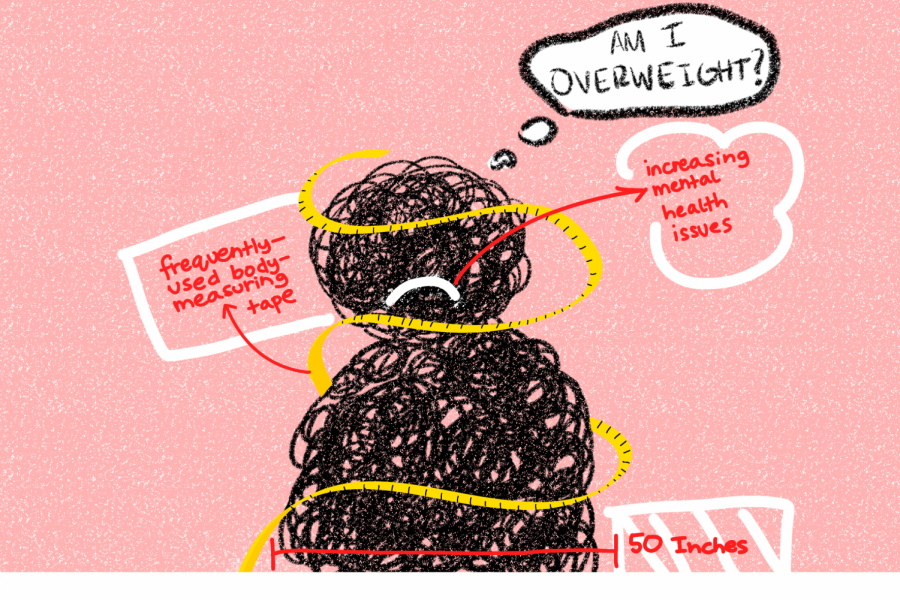The elephant in the room
In our society, being overweight comes with a stigma, and having been on both sides of the weight fence, I have some thoughts to share.
The stigma surrounding this community causes mental health issues that can permanently harm the subject.
December 3, 2021
150 pounds.
That’s the number I saw when I first stepped on the doctor’s scale in 4th grade.
Growing up, I was always the biggest kid in my grade. Did I ever stop and think about it? No, I mean, I was young. I didn’t care what I looked like as long as I was happy.
Then third grade came around, and suddenly I felt as if I was the elephant in the room (quite literally). My weight didn’t bother me until others started to point it out.
I know, you’ve all heard the cliche stories of overweight kids not getting picked for dodgeball in gym class— well, that cliche was literally true for me. That type of scenario was actually one of the first instances in which I felt “different.”
I was always the last pick. The comments were always, “Oh I don’t think he’ll run much” or “He looks slow.” And this wasn’t the only environment that made me notice my “difference.”
The fat jokes were never ending— it made me hate going to school. Kids would make whale noises and ask questions like, “How much McDonald’s have you had?” These are the types of comments that really changed the way I looked at myself as well as the world around me.
I started to feel ashamed. I couldn’t look at my body without feeling disgusted. Finally, I mustered up the courage to talk to my parents about my weight, but they simply blew me off.
They said something like, “It’s just baby weight, you’re healthy that’s all.”
At the time, I wondered why they couldn’t just tell me that I was overweight. Was it because in our society it has become shameful to be overweight?
Now, I realize that people look down on you and treat you differently because of your weight. I have seen the stigma first hand.
Having lived in two body types, I’ve had the unique ability to witness how the stigma changes lives.
Six years after that traumatic first weigh in at the doctor’s office, I have changed my whole lifestyle. If you look at pictures of me from my elementary days versus now, I look like a whole different person.
Over these past six years I have seen this “fat” stamp fade away, but it will always be a part of me. Looking at my social interactions from elementary years to now, I see how peoples’ attitudes and mannerisms changed solely based on my weight.
Here are some of the differences I’ve noticed after living in two different body types.
New people I meet are more friendly to me.
People expect more physicality from me such as being able to do certain workouts.
People’s comments about what I eat have changed.
I have gained more friends
I am expected to be more confident
Why did any of this have to change? After all, I still am the same person. The only difference to society is how I appear.
Because someone appears to be “fat,” the world already has an idea of their personality and capabilities and unfortunately, the assumption is negative. That’s why peoples’ interactions have gotten more friendly with me: because I lost weight, the interactions have gotten more positive, they expect me to be “cooler.”
Have you noticed that in all the “classic” movies, the popular people are always thin? Our society has embedded the weight expectations and stigmas into our lives by incorporating them into the movies and shows we watch.
Although recently our society has tried to fix this by making “plus-sized” or “moderately-sized” bodies more recognized and accepted with the body positivity movement, the unconscious stigma around those that are overweight remains.
The feeling of being “different” is something I will always remember because it never quite goes away. The stamp may have faded, but the comments said to me are things I will never forget.
This stigma causes individuals to have body image issues throughout our whole lives. The feeling of looking in the mirror and seeing yourself look “heavy” is like getting poked with thin needles in your heart. The pain slowly adds up until you eventually have to make a decision.
This is why I choose to lose weight. I had had enough of feeling this way about myself, but even now, six years later, I still look in the mirror and the tiny needles add up.
The stigma has to come to an end, but I wonder, will it ever?
I know it sounds pessimistic, but it’s true: these negative assumptions may never come to an end because they have been programmed into us.
The only way we could possibly shift this perspective is by teaching kids about the nuances and causes of weight gain and obesity. It’s not all “Oh you’re overweight because you eat fast food and don’t exercise.” Not by a longshot, but that’s for another article.
But for now I will remain in my changed world, seeing how people have conformed their behavior to the appearance of my weight. But I will always remember the feeling of being the “elephant in the room.”





























































Jill Harden • Dec 6, 2021 at 9:42 am
Thank you for writing this, Alex.